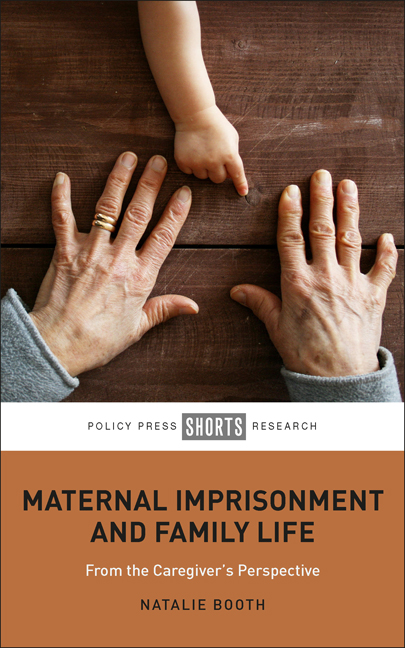Book contents
- Frontmatter
- Contents
- List of Tables
- Acknowledgements
- Preface: Linda’s Story
- One The Landscape of Maternal Imprisonment: Caregiving and Family Life
- Two Researching the Caregiver’S Lived Experiences
- Three Family Constructions and Caregiving Practices
- Four Renegotiating Family Life: Caregiving in the Aftermath of the Mother’S Imprisonment
- Five Navigating the Criminal Justice System
- Six Social Support, Familial Stigma and Release
- Seven Kin Caregiving: Occupying a Disenfranchised Status While Serving the Family Sentence
- Eight Reflections on the Research Process
- References
- Index
One - The Landscape of Maternal Imprisonment: Caregiving and Family Life
Published online by Cambridge University Press: 10 March 2021
- Frontmatter
- Contents
- List of Tables
- Acknowledgements
- Preface: Linda’s Story
- One The Landscape of Maternal Imprisonment: Caregiving and Family Life
- Two Researching the Caregiver’S Lived Experiences
- Three Family Constructions and Caregiving Practices
- Four Renegotiating Family Life: Caregiving in the Aftermath of the Mother’S Imprisonment
- Five Navigating the Criminal Justice System
- Six Social Support, Familial Stigma and Release
- Seven Kin Caregiving: Occupying a Disenfranchised Status While Serving the Family Sentence
- Eight Reflections on the Research Process
- References
- Index
Summary
Introduction
This book explores the lives and experiences of family members and friends caring for the children of female prisoners in England and Wales. It provides an opportunity to understand some of the challenges and realities of (re)negotiating family life when a mother is sent to prison from the perspectives of caregiving relatives. Over 2.5 million children are thought to experience parental imprisonment across Europe every year (Noffke, 2017); meanwhile, the most recent estimates for England and Wales suggest that around 17,000 are separated from their imprisoned mothers a year (Howard League for Penal Reform, 2011; Crest Advisory, 2019). These high figures result from most women in prison being mothers, with research suggesting that children remain in the care of relatives – often grandparents and female kin – while their mother is imprisoned (Caddle and Crisp, 1997; PRT [Prison Reform Trust], 2018). Previous studies highlight how the separation that maternal imprisonment brings has multiple adverse consequences for both mothers (Enos, 2001; Baldwin, 2015; Masson, 2019) and children (Sharratt, 2014; Jones et al, 2013; Minson, 2018a). Yet, much less is known about how the experience of a mother's imprisonment impacts the daily lives and practices of the relatives who assume care for children. There is limited understanding about the ways in which caregiving is assumed and shared within families in the absence of the mother. There is little in-depth exploration of how caregiving kin interpret, manage and respond to these additional childcare responsibilities in their everyday lives; meanwhile, there is little discussion of the limited statutory support made available to these families.
This book answers these questions by situating caregiving kin at the heart of the inquiry through a family-centred analysis of existing knowledge and a privileging their own accounts of their circumstances when presenting the research data (Booth, 2017a). This was achieved through the application of Morgan's (1996, 2011) theoretical lens of ‘family practices’, which facilitated a critical exploration of what families ‘do’, characterised by a sense of the everyday activities and relationships that have social meaning, and that are grounded in history and biography (for more information, see Chapter Two). Significantly, the application of this sociological theory to a field primarily studied by criminologists produced new insights into family constructions and caregiving practices.
- Type
- Chapter
- Information
- Maternal Imprisonment and Family LifeFrom the Caregiver's Perspective, pp. 1 - 18Publisher: Bristol University PressPrint publication year: 2020



